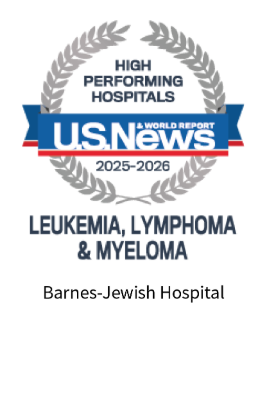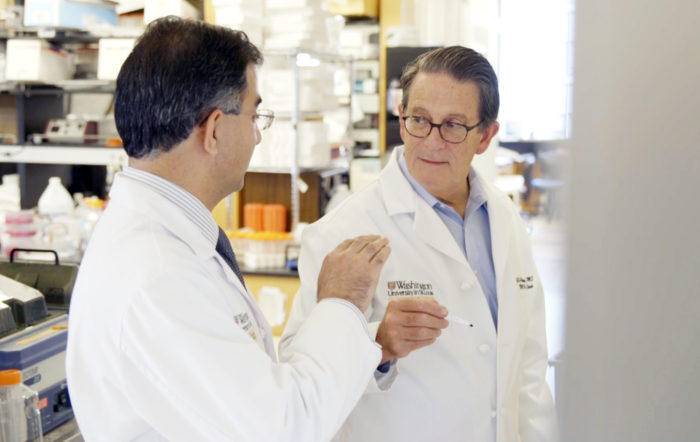Lymphoma
Lymphoma is a complex type of blood cancer that requires advanced, customized treatment. We have the tools to carefully diagnose and effectively treat all types of lymphoma. Our expert team uses innovative therapies to create a personalized treatment plan just for you.
Why choose us for lymphoma care?

BJC HealthCare offers excellent care for lymphoma, at any stage. Our Siteman Cancer Center at Barnes-Jewish Hospital and WashU Medicine, along with its five satellite locations, is designated a Comprehensive Cancer Center by the National Cancer Institute (NCI).
In addition to Siteman locations, BJC HealthCare offers comprehensive and convenient care in locations across the region. Our Missouri Baptist Medical Center program is ranked among the top regional hospitals by U.S. News & World Report as high performing in lymphoma and myeloma and is nationally accredited by the Commission on Cancer (CoC).
We combine a comprehensive and multidisciplinary approach, research, and clinical excellence in locations designed by patients, doctors, and nurses. Decades of experience has taught us that when treating cancer, comfort and compassion are just as important as the science of medicine.
When you to come to us for lymphoma treatment, you can expect:
- A reputation for excellence: Siteman Cancer Center provides access to superior care close to home. Siteman is consistently ranked as one of the top 10 cancer centers in the nation by U.S. News & World Report.
- Precision diagnosis: Lymphoma is a complex disease that can be difficult to diagnose. That’s why you need a team with expertise in recognizing lymphoma in all its forms. An accurate diagnosis is the first step toward building an effective treatment plan.
- Innovative treatment options: Our advanced therapies include stem cell transplants and pioneering CAR T-cell therapy. These systemic treatments can help destroy cancer cells throughout your body.
- Team approach to care: Effective treatment for lymphoma often requires the expertise of multiple doctors. Our lymphoma team includes medical oncologists, radiation oncologists, and hematologists. Together, they create a customized treatment plan for each patient.
- Research and clinical trials: New therapies for lymphoma—as well as novel combinations of therapies—are constantly evolving. Our doctors participate in cutting-edge clinical trials that help us improve treatment options. That means you have access to the latest discoveries sooner.
- Support when you need it most: Treatment for lymphoma can be a long and challenging process. We understand the toll this can take on your physical and emotional well-being. Our care includes a variety of cancer support services for you and your family—including nutritional guidance and mental health counseling. Our goal is to help you improve your quality of life during and after treatment.

The Siteman approach to lymphoma
When you come to Siteman, you’ll be treated by oncologists who specialize in the treatment of patients with lymphoma. They also conduct lab research into lymphoma and run clinical trials studying new drugs and techniques.
What is lymphoma?
Lymphoma isn’t just a single disease. In fact, there are at least 90 different types of blood cancers that fall into the category of lymphoma.
Lymphoma is a type of blood cancer that begins in the white blood cells (called lymphocytes). These cells are part of your body’s immune system. The abnormal cells can multiply quickly and travel through your blood and lymph systems.
Left unchecked, lymphoma can spread into your lymph nodes, bone marrow, spleen, and other organs. Lymphoma is the most common type of blood cancer. The disease affects nearly 90,000 adults in the U.S. each year.
Types of lymphoma
There are dozens of different types of lymphoma, but the two main categories are:
- Non-Hodgkin lymphoma (NHL): This type is the most common. NHL accounts for about 90% of all the lymphoma cases we diagnose. Within this category, there are B-cell lymphomas and T-cell lymphomas. These are based on whether the cancer forms in your immune system’s B-cells or T-cells.
- Hodgkin lymphoma: This type is less common, but also much more easily treated (and frequently cured). It’s characterized by the presence of Reed-Sternberg cells, lymphocytes which can have more than one nucleus.
How is lymphoma diagnosed?
Because there are so many different subtypes of lymphoma, it can be difficult to diagnose. At BJC, we understand how important it is for you to receive a timely and accurate diagnosis. Our lymphoma specialists are experts at determining different types of lymphoma.
We use a variety of methods to identify the type, location, and stage of lymphoma. These tests may include:
- Blood tests
- Bone marrow biopsy
- Imaging tests, such as PET or CT scans
How is lymphoma treated?
Lymphoma treatment varies depending on the type of lymphoma, as well as where it has spread within your body. Because lymphoma affects your blood and immune system, most treatments are systemic. This means that they target your whole lymph system or entire body. For this reason, surgery is rarely necessary.
Treatment for Hodgkins and non-Hodgkins lymphoma may include a combination of therapies, including: